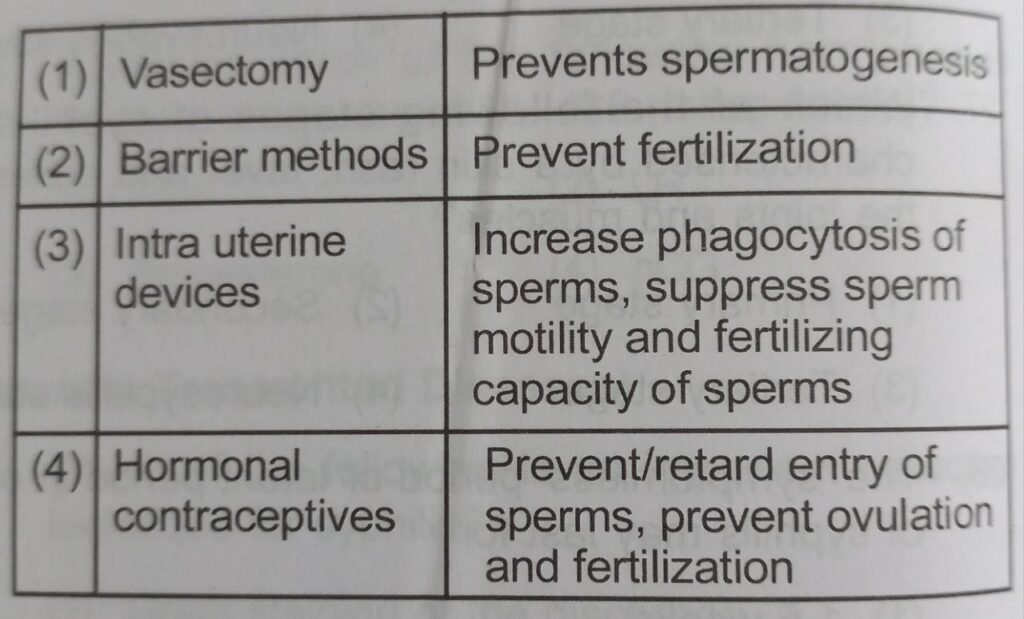Here are 15 NEET questions from chapter Reproductive Health. Attempt these 15 important reproductive health NEET questions.
1. In a growing population of a country, [NEET 2018]
(!) Pre-reproductive individuals are more than the reproductive individuals
(2) Reproductive individuals are less than the post- reproductive individuals.
(3) Pre-reproductive individuals are less than the reproductive individuals
(4) Reproductive and pre-reproductive individuals are equal in number
2. The contraceptive ‘SAHELI’ [NEET 2018]
(1) Blocks estrogen receptors in the uterus, preventing eggs from getting implanted
(2) Increases the concentration of estrogen and prevents ovulation in females
(3) Is a post-coital contraceptive
(4) Is an IUD
3. The function of copper ions in copper releasing IUD’s is [NEET 2017]
(1) They suppress sperm motility and fertilizing capacity of sperms
(2) They inhibit gametogenesis
(3) They make uterus unsuitable for implantation
(4) They inhibit ovulation
4. In case of a couple where the male is having a low sperm count, which technique will be suitable for fertilization? [NEET 2017]
(1) Intrauterine transfer
(2) Gamete intracytoplasmic fallopian transfer
(3) Artificial insemination
(4) Intracytoplasmic sperm injection
5. Which of the following is hormone releasing IUD? [NEET Phase-2 2016]
(1) LNG-20
(2) Multiload-375
(3) Lippes loop
(4) Cu7
6. Which of the following is incorrect regarding vasectomy? [NEET Phase-2 2016]
(1) No sperm occurs in seminal fluid
(2) No sperm occurs in epididymis
(3) Vasa deferentia is cut and tied
(4) Irreversible sterility
7. Embryo with more than 16 blastomeres formed due to in-vitro fertilization is transferred into
[NEET Phase-2 2016]
(1) Uterus
(2) Fallopian tube
(3) Fimbriae
(4) Cervix
8. In context of amniocentesis which of the following statements is incorrect? [NEET 2016]
(1) It can be used for detection of Cleft palate
(2) It is usually done when a woman is between 14-16 weeks pregnant
(3) It is used for pre-natal sex determination
(4) It can be used for detection of down syndrome
9. Which of the following approaches does not give the defined objective of contraceptive?
[NEET 2016]

10. Which of the following cannot be detected in a developing foetus by amniocentesis ? [NEET 2013]
(1) Sex of the foetus
(2) Down syndrome
(3) Jaundice
(4) Klinefelter syndrome
11. Artificial insemination means
(1) Transfer of sperms of husband to a test tube containing ova
(2) Artificial introduction of sperms of a healthy donor into the vagina
(3) Introduction of sperms of a healthy donor directly into the ovary
(4) Transfer of sperms of a healthy donor to a test tube containing ova
12. Which of the following is not a sexually transmitted disease? [AIPMT 2015]
(1) Encephalitis
(2) Syphilis
(3) Acquired Immunodeficiency syndrome (AIDS)
(4) Trichomoniasis
13. Tubectomy is a method of sterilization in which [AIPMT 2014]
(1) Small part of the fallopian tube is removed or tied up
(2) Ovaries are removed surgically
(3) Small part of vas deferens is removed or tied up
(4) Uterus is removed surgically
14. Which of the following is most widely accepted method of contraception in India at present? [AIPMT Prelims 2011]
(1) IUD’s
(2) Cervical caps
(3) Tubectomy
(4) Diaphragms
15. Medical termination of pregnancy is considered safe up to how many weeks of pregnancy? [AIPMT Prelims 2011]
(1) Six weeks
(2) Eight weeks
(3) Twelve weeks
(4) Eighteen weeks
So these are 15 reproductive health NEET questions. How many of them you got right ?
